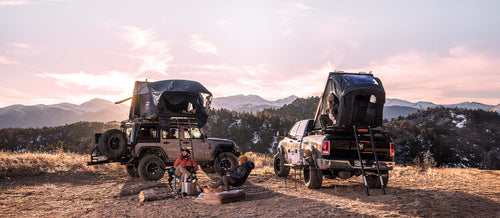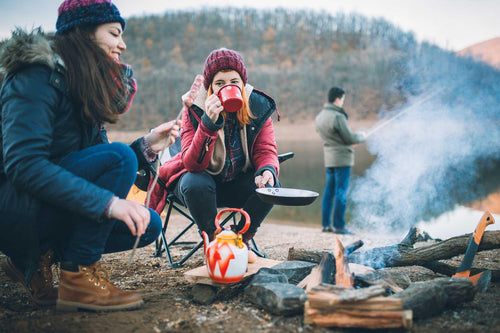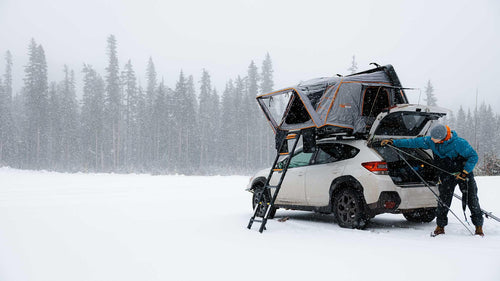It’s hard to beat camping in the fall…long drives through changing leaves, layering up your hard shell roof top tent with extra blankets, and ending a long hike or mountain bike ride beside a warm fire. The last thing you want to worry about while exploring the wilderness is uncomfortable or even dangerous encounters with wildlife. Not only do you want to make sure you and your stuff stay safe, you want to make sure the animals don’t get into something that could harm them or the beautiful environment in which they live. Below we share some handy tips for minimizing unwanted wildlife encounters so you can keep you and your family (including pets) safe while camping, while protecting wildlife and the environment, too.
What Attracts Wildlife
It can be an incredible moment seeing a wild animal in their natural habitat while camping. But it’s a whole new ballgame when you wake up to a raccoon, deer, or even bear digging through the trash bag attached to your tent! Leaving out your trash or food is one of the easiest ways to attract wildlife. And certain food and cooking items are more likely to attract more wildlife than others. Typically, animals are most attracted to:
- Trash
- Dirty dishes and cooking utensils
- Toiletries
- Fuel
- Coolers
- Dirty cleaning items like rags and buckets
Dangers of Attracting Wildlife
While encountering a bear or mountain lion during your camping trip is scary enough to convince you to not leave out anything that might attract them, there are even more consequences to these encounters than you might think. Some animals can become too used to humans and human food, putting them in danger of having to put down by wildlife management. Other times, encounters with humans can be surprising and stressful for wild animals, causing them to use the energy that they should be saving flee from prey in the wild Not to mention the danger of attracting a feral or aggressive animal into your campsite. Knowing what animals are most attracted to is the first step to making sure these items are cleaned up and stored away so animals can’t access them. Keep on reading to find out how to do just that.
1) Keep Your Food and Trash Properly Stored
Just like us, wild animals love the alluring scent of a delicious camp meal. Help the animals resist temptation by making sure your food is properly stored once you’re finished with it.
- If you’re in an established campsite, check with the campground staff to see which methods they recommend for keeping yourself and wildlife safe. They can also provide any other pointers that are unique to the area you’re staying in.
- Store all food and utensils airtight containers or special camping canisters to help keep wildlife from being attracted to the smells.
- Once it’s in its proper containers, keep anything that might attract an animal locked in a cooler or utility box.
- Citrus is a natural bear repellant, so toss some oranges or orange peels in for extra safety.
- Keep all food out of and away from your tent to help keep animals from approaching.
- Be mindful of food scraps left behind after cooking. Dispose of them in Ziplock bags or Tupperware, and clean up any residue with hot water.
And remember to never, ever feed wildlife, as they’ll want to return — perhaps with company!
2) Choose Your Campsite Wisely
The location of your campsite can make or break your experience with many things — from your view and location to water, to the types of wildlife encounters you may have. Keep animal habitats in mind when choosing a dispersed camp spot. Remember that while that alluring spot by a lake or river is beautiful, you could also encounter more mosquitos, raccoons, and bears who tend to stay close to water sources. Similarly, anywhere that’s heavily wooded could have bears, raccoons or skunks, and places with tall grass may be home for various species of snakes depending on the area you’re in. Choose an open area away from tall grasses or bushes. A few trees are okay, as you’ll need a place to hang your trash bags to keep it out of the reach of most wildlife. Stay around 200 feet away from water sources, ideally away from a trail as animals use them as often as humans. Human waste can quickly contaminate the animal’s drinking water.
3) Keep Your Trash Safe
Trash is another way to attract wildlife of all sizes. Attracting wildlife with trash can put you and the wild animals in danger by startling the animal or stressing it out, which could potentially create an unsafe encounter (or other issues, like the animal growing accustomed to sniffing around campsites for snacks). First, place any food remnants in sealed plastic bags before throwing them away. While many campgrounds have bear-safe trash receptacles, you’ll want to take a few extra safety measures if you’re in a less established camping area. Double bag your trash in durable, odor-killing bags, and hang them on a branch high off the ground and 8-10 feet away from the trunk when possible. This helps keep away raccoons, rodents and the snakes they attract. If you’re camping near other people, try to use a different tree than they are to hang trash, as too much trash in one place this will make your site a target.
4) Use Natural Animal Repellants
Some scents that are barely noticeable or even smell nice to us can be used to repel animals. Try one of these all-natural methods of keeping your campsite safe by placing the repellants around the areas you’d like to protect like your campground, tent, food and trash.
- Leave out a few cloves of garlic to help repel mosquitoes, raccoons, and rodents
- Flashing lights keep away bears, mountain lions, and nocturnal animals
- Coffee grounds can help deter mosquitoes
- Cinnamon and clove repels snakes
- Natural dog and cat repellants can help keep away raccoons and bears
Keeping Wildlife Safe from You
While you want to be safe from wildlife, you’ll also want to head home with a clear conscience knowing the ecosystem you enjoyed stayed safe, too. Here are a few ways to do so:
Keep the Water Clean
Avoid contaminating the water sources by using all-natural, biodegradable toiletries and dumping any dirty water from laundry or dishes at least 200 feet away from the water source. If you need to shower with soap, bring extra water to do so, and do it at least 200 feet from any natural water source. Bring handy containers that help you use less water: A small squirt bottle, for example, can be helpful for washing your face.
Leave No Trace
Overall, you should be focused on leaving your campsite and the areas you explored looking the same, if not better, than before you arrived. That means:
- “Pack it out” or bring every bit of trash, recycling, and other remnants with you to dump outside the campsite.
- Keep your dog nearby to prevent them from scaring or endangering other wildlife (or themselves!)
- When you need to go to the bathroom in the wild, dig a 6-foot hole at least 200 feet away from a water source to relieve yourself. Check out more options for “when nature calls” when you’re camping >
- Clean up your campfire by scattering any rocks you gathered and disposing of ash away from water sources.
Stay Heads Above the Rest in a Hard Shell Roof Top Tent
You can prevent critters and creatures alike from reaching you by staying safe and sound high above ground in a Roofnest hard shell root top tent. Roofnests attach to the top of your vehicle, keeping you out of reach from squirrels, snakes, skunks, and more. Just ask the family who avoided an unexpected spider infestation in their campsite thanks to their Roofnest! Discover how a Roofnest can save your next camp trip >




